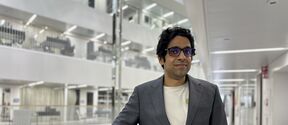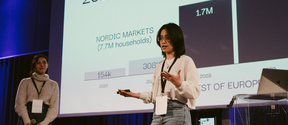Visualisers of the effects of climate change and weather information winners of the NASA Europa Challenge competition
The competing applications utilise NASA's World Wind. It is an open access code programme interface on whose basis it is possible, for instance, to create 3D visualisations of terrain and cities, predict weather phenomena, and monitor traffic. Image: NASA
The winners of the NASA Europa Challenge application competition, which was organised for the first time in Finland, have been chosen. The judges consisted of Finnish and foreign experts in the fields of space, satellites and climate. Out of 11 finalists, AgroSphere developed by an American team and World Weather developed by a Jordanian-Finnish team were chosen as winners. The second place was awarded to an Italian team and their solution MuViAS: Multi Dimension Viz & Analysis Suite.
The aim of the competition was to find new, creative solutions that promote sustainable development and utilise open satellite data and NASA's World Wind programming platform.
One of the winners, AgroSphere developed for teaching purposes, combines climate data and information on the development of agricultural crop production. This way it can visualise how the climate change affects agriculture. The application was developed by John Nguyen, Mingda Tang, Stacey Chen, Atreya Iyer and Nick Rubel from NASAs World Wind 2017 Intern team.
The other solution on the shared first place, World Weather, is an application for scientists, meteorologists and weather enthusiasts that creates 3D and 4D displays using weather data from different sources. These displays can be used to monitor weather phenomena and to predict the development of the climate. Behind this solution are Khaled Sharif and Farah Salah, who have participated in NASAs internship program.
MuViAS: Multi Dimension Viz & Analysis Suite that came second in the competition enables effective visualisation of files. It was developed by Gabriele Prestifilippo, Simone Battaglia, Giulia Petrillo and Maria Rita Battaglia from the Polytechnic University of Milan and University of Bologna.
‘The students from Agrosphere and WorldWeather teams did a great job at integrating the data relevant to agriculture and weather respectably into the applications usable by both general public and specialist in the fields. I hope to see these applications on the market in the future,’ says Jakub Balhar, one of the judges.
The most international group in the history of the competition
In the evaluation, the judges gave particular emphasis to the technical complexity, implementation and functionality of the applications. They also evaluated the user interfaces of the applications, the website presenting the applications and the significance of the ideas.
The participants are the most international group in the history of the competition, now organised for the fifth time: the 21 teams included participants from China, India, Spain and the United States.
This year, the theme of the NASA Europa Challenge was improvement of living conditions in metropolitan areas. Finland was a natural choice for the site of the competition: the space boom has created several start-ups in the field, and the European Space Agency (ESA) has chosen Finland as the new home of its space accelerator.
‘And Helsinki is known around the world as one of the best cities to live in,’ reminds one of the judges, professor Jaan Praks from the Aalto University.
‘It has been very exciting to see so much up a coming talent from all throughout the world coming together in Helsinki to collaborate on solutions that tackle humanity's challenges in sustainable living, smart urban infrastructure management, efficient resource handling, and geospatial data-driven agriculture. By developing applications that serve the needs of every team's local community, we all learn more about each other while we share ways to increase the quality of life of our living spaces, using the open source development mindset as cornerstone of collaboration. We're very eager to know who the winners of this year's challenge will be, and of course, stay tuned for the next edition of the NASA WorldWind Europa Challenge,’ says Miguel del Castillo, former intern at NASA who has previously competed in the final.
Additional information
Competition organizer Mikko Järvilehto
Ultrahack
Tel. +358 40 508 6265
mikko.jarvilehto@ultrahack.org
Read more news

Enhancing doctoral researchers’ work-life skills – Join the DOC+ events
Doctoral student or postdoc, have you been pondering about building a meaningful doctoral career? Or about the future of AI in research and working life? These events and learning opportunities are for you!
Specialised AI models could be Finland's next global export
Specialised, resource-efficient AI models could be the next competitive edge of our country, and a way to stand out among the use of large language models.
Virtual Reality and AI summer course focuses on technology as a means for human-centric innovation
Gautam Vishwanath is the teacher for the new summer course Introduction to Virtual Reality and Artificial Intelligence this summer. In this interview, he lets us in on how these technologies will reshape how we experience history, empathise with distant conflicts, and influence persuasion.






